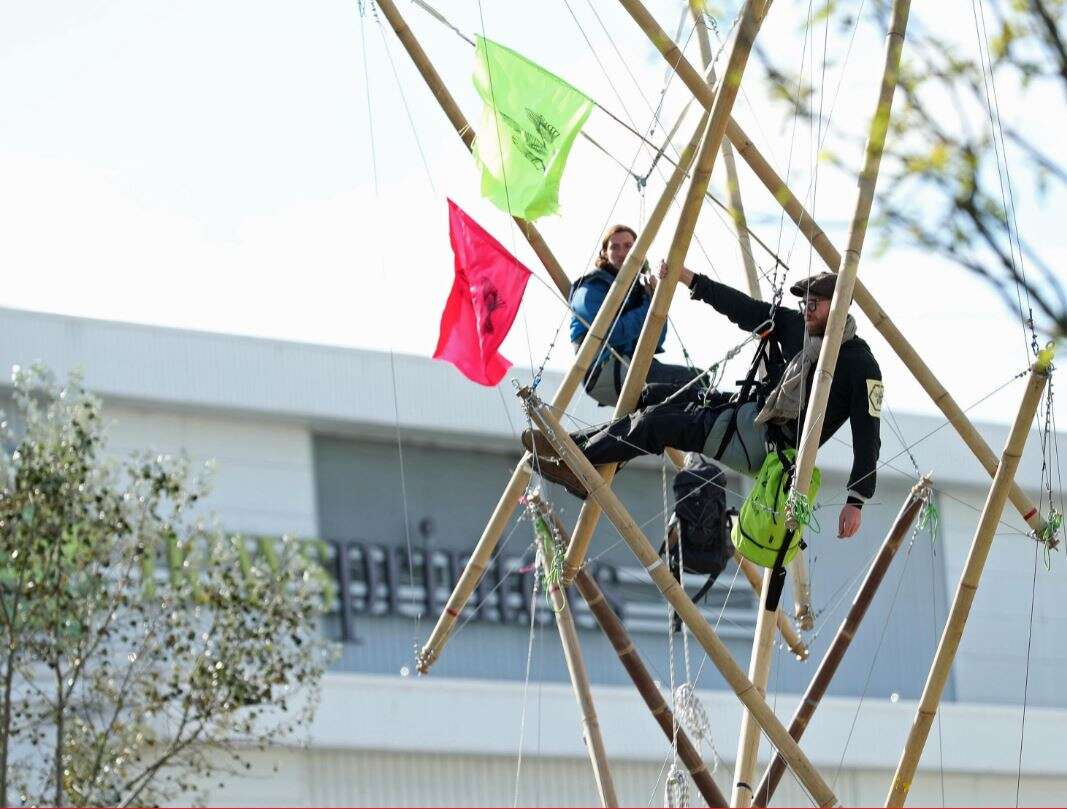
Extinction Rebellion protesters say the disruption caused to staff at a newspaper printing factory was “proportionate” in light of the climate emergency, a court has heard.
Five XR activists, who were part of a 14-hour blockade at Newsprinters in Broxbourne, Hertfordshire, from late on 4 September 2020, are appealing against their convictions.
They were found guilty of obstructing the highway during two trials at St Albans Magistrates’ Court in 2021.
The protesters are now questioning whether there was political interference in the police action to shut down the demonstration.
Hertfordshire Constabulary Chief Constable Charlie Hall received several calls from Home Secretary Priti Patel throughout the night, St Albans Crown Court has heard.
They are also arguing their actions were justified by freedom of expression and by their rights to freedom of assembly and association.
About 50 to 60 XR members used vehicles and bamboo structures to deny access to or from the Broxbourne site, with some locking their hands in plastic tubes that were filled with cement.
Newsprinters, which is owned by News UK and publishes papers like The Daily Telegraph, The Sun, The Times and the Daily Mail, lost an estimated £1.2m due to the disruption, which also affected nearby businesses and a hotel.
St Albans Crown Court heard how Newsprinters staff on the 7pm to 4am shift were unable to leave the site in their cars when they wanted to go home, due to the blockade, while delivery drivers were also blocked from doing their work.
Alan Brett, manufacturing director of Newsprinters, described the atmosphere among staff during the protest, telling the court the staff were “frustrated, angry, upset”.
“They were frustrated by the fact that they could not get home and the fact that their jobs were impacted,” he added.
“I was trying to calm their frustrations,” he said.
“There was shouting at the protesters as they went to get their taxis.”
However, the activists later told the court that they believed their actions were “proportionate”, due to the urgency of the climate emergency compared with the disruption caused to staff during one news cycle.
They also argued that a full blockade was the only way to draw major attention to the way the press, in particular Rupert Murdoch’s newspapers The Sun and The Times, cover the crisis.
Caspar Hughes, 49, told the court: “The objective was to pause the distribution of the press, particularly the press printed at Murdoch’s printing press in Broxbourne, for one news cycle.”
Asked why the protesters had to obstruct the whole road, meaning staff could not leave in their cars, he said: “The fact that it was reported [in the media] was because we put our finger on the point of power by completely blockading the road.
“While our effect on the staff was not pleasant to see, the effect Mr Murdoch has on the public is phenomenal, so we thought our action was proportionate.”
During her evidence, Charlotte Kirin, 53, added: “It was a few hours’ interruption of an industry that has been having its say every day for years and years, and continues to publish stories that seem to ask us to focus our attention and anger on the individuals who are disadvantaged by society, rather than focus on the source of power where the harm is actually happening.
“It felt proportionate to me.”
Laura Frandsend, 32, also told the court: “I took this action because innocent people are going to be affected by the climate crisis – the staff, their children – they are also going to be affected.
“I think they are going to be more affected by the climate emergency than one night of not going home.”
Liam Norton, 37, said: “We are talking about proportional in terms of one evening’s disruption compared to many years, many decades able to operate unhinged.”
Sally Davidson, 34, said: “In order to effectively get our message out, it needed to be disruptive.
“That was done proportionately, respectfully and peacefully and was necessary in order for the public to be aware that these publications are not upholding their responsibility to uphold democracy through a free press.”
Frandsend, of Horsens in Jutland, Denmark; and Hughes, of Exeter, Devon, are among those who were convicted.
Kirin, of Bury St Edmunds, Suffolk; Norton, of Scarborough, North Yorkshire, and Davidson, of Streatham, south-west London, are also appealing against their convictions.
Picture: Yui Mok/PA Wire
Email pged@pressgazette.co.uk to point out mistakes, provide story tips or send in a letter for publication on our "Letters Page" blog
